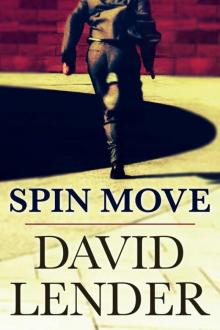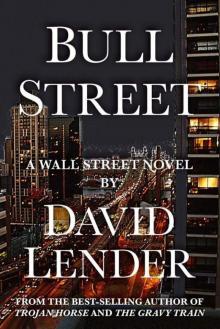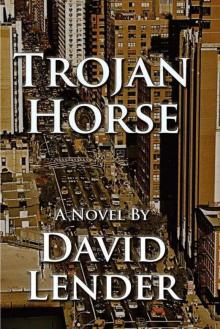- Home
- David Lender
Arab Summer
Arab Summer Read online
The characters and events portrayed in this book are fictitious. Any similarity to real persons, living or dead, is coincidental and not intended by the author
Text copyright © 2012 by David T. Lender
All rights reserved.
No part of this book may be reproduced, or stored in a retrieval system, or transmitted in any form or by any means, electronic, mechanical, photocopying, recording, or otherwise, without express written permission of the publisher.
Published by Thomas & Mercer
P.O. Box 400818
Las Vegas, NV 89140
ISBN-13: 9781611097832
ISBN-10: 1611097835
For Berny Schwartz
ALSO BY DAVID LENDER
Trojan Horse
Trojan Horse is a love story built around a thriller about a Wall Streeter who falls in love with an exotic spy and then teams up with her to stop a Muslim terrorist plot to cripple the world’s oil capacity.
The Gravy Train
The Gravy Train is the story of a novice investment banker who helps an aging Chairman try to buy his company back from bankruptcy, pitted against ruthless Wall Street sharks who want to carve it up for themselves.
Bull Street
Bull Street is the story of a naive, young Wall Streeter who gives a jaded billionaire the chance for redemption, as they team up to bring down an insider trading ring before they wind up in jail or dead.
Vaccine Nation
Vaccine Nation is the story of an award-winning documentary filmmaker who is handed “whistleblower” evidence about the US vaccination program, and then races to expose it before a megalomaniacal pharmaceutical company CEO can have her killed.
CONTENTS
CHAPTER 1
CHAPTER 2
CHAPTER 3
CHAPTER 4
CHAPTER 5
CHAPTER 6
CHAPTER 7
CHAPTER 8
CHAPTER 9
CHAPTER 10
CHAPTER 11
CHAPTER 12
CHAPTER 13
CHAPTER 14
CHAPTER 15
CHAPTER 16
CHAPTER 17
CHAPTER 18
CHAPTER 19
CHAPTER 20
AUTHOR’S NOTE
ACKNOWLEDGMENTS
EXCERPT FROM TROJAN HORSE
ABOUT THE AUTHOR
CHAPTER 1
Eighteen months ago.
SASHA DEL MIRA SMILED AT the baker as she took the loaf of bread he handed her over the counter. “Danka, Herr Gustoven,” she said, turned and stepped back into the throng of people in the shop. It was Saturday morning, 9:00 a.m., and the shops in Old Town in Geneva were already crammed with tourists. Sasha knew the shopkeepers loved the traffic, but it was locals like Sasha who filled the cash registers on their Saturday-morning rounds for their weekend essentials, walking directly to the counters with purpose instead of milling around and gawking like the foreigners. She worked her way to the door, hearing French, English, German and Italian being spoken. A typical spring Saturday. Near the door she encountered a man poring over a Michelin guide. Two girls, perhaps seven and ten years old, stared up at him.
“Please, Daddy,” the younger one said in American English.
“In a moment, Sandy,” the man said without looking up from the guide, “I’m looking for something.”
Sasha stopped in front of the girls. “Can I help?”
The older girl looked up with relief in her eyes. “Oh, thank God. You speak English. Are you British?”
“No, raised across the lake from here, mostly. My English tutor was British.” She smiled. “Can I help?” she repeated.
“Daddy said we could have treats, but we don’t speak the language.”
“There’s a universal language for that,” Sasha said, and motioned toward the display cases filled with neat rows of pastries, cakes, pies, strudel and torts. “May I show you?”
The man finally looked up from his Michelin guide. He smiled at Sasha and nodded to the girls. They followed Sasha to the display case. “Just point,” she said. The younger one pointed to a Napoleon, the older one to a custard torte. Sasha raised her hand. “Bitte, Frau Gustoven.” The gray-haired matron behind the counter smiled, then crouched behind the case and observed where each girl now pressed her finger against the glass. She retrieved the pastries, wrapped them in baker’s paper and passed them over the counter. Sasha handed them to the girls and turned to see their father holding out a handful of Swiss francs. She pulled out seven francs and handed them to Frau Gustoven. “Vielen Dank,” Sasha said. “Guten Tag.” Sasha turned to leave, said to the man, “Enjoy your stay in Geneva.” The man thanked her.
Her errands finished, Sasha left the fragrant warmth of the shop and stepped outside into the cool April air. She shifted her grocery bags into one hand and pulled the collar of her blazer up around her neck against the damp breeze off Lake Geneva. She walked across along Place du Bourg-de-Four, relishing the familiar feeling of the uneven cobblestones under her feet, taking in the 16th-and 17th-century limestone facades of the shops. Swiss locals in sports jackets with ties, walking with stiff formality, intermingled on the sidewalks with the tourists in their brightly colored parkas, Polo khakis, $200 Nikes and backpacks. Sasha smiled, loving it, and continued onto Rue de la Fontaine to descend the hill from Old Town to the center of Geneva.
When she reached the Pont du Mont-Blanc she picked up her pace. Daniel would be home from the gym soon. She wanted to arrive before him, get breakfast started and lay out the dishes as part of a peace offering. She forgot who had once dispensed to her that newlywed advice, “Never go to bed angry at each other,” but it rang loudly in her ears now. Then she was laughing to herself over it, because now, after six months, it felt like they were an old married couple. On reflection, the argument last night could have been avoided if only she’d held her tongue. Telling Daniel he’d had too much wine as she pulled him into the foyer to leave the Delarches’ apartment, loudly enough to be overheard, wasn’t politic, particularly since she’d had too much wine herself. They’d ridden home in a taxi in silence. This morning, Daniel had left for the gym without a word. Sasha figured a cheery hello and the table set for breakfast would put things back on an even keel.
She walked up Rue du Mont-Blanc and had entered Rue Ami-Lévrier, hurrying now, when she noticed a man was walking behind her, seeming to match her pace. She slowed to let him pass. He slowed. She felt a bolt of alarm and slid her hand into her handbag, felt for the grip of her 9mm Beretta Cheetah. The American from the baker’s? She took a sharp breath, stopped and turned. It was a portly man in a sweat suit. He widened his eyes at her abrupt movement, then smiled, said, “Guten Morgen,” averted his eyes and walked past.
Sasha could feel her pulse in her temples as she watched him turn the corner onto Rue des Alpes. She exhaled. She remembered Daniel’s constant admonishments of her for being paranoid. Or just careful?
She continued down Rue Ami-Lévrier, then opened the door to their apartment building.
“Hello, Miss Sasha,” François said from behind his security desk when she entered and crossed the lobby to the elevator. She checked her watch on the elevator, tapping her foot. Upstairs, she hurried, hoping to get breakfast well on its way before Daniel returned home. The ingredients for their goat cheese, sun-dried tomato and caramelized onion omelets were all prepared and waiting when she heard Daniel enter. She brushed her hair back from her eyes, looking up at him as he crossed the dining room into the kitchen. His tan from their two weeks in St. Maarten made him gleam like a sun god, warming her.
“Sorry I got so pissed off,” he said.
“My fault, darling, I had too much wine.” She smiled back. Her rising desire and hunger for
him told her it wouldn’t require breakfast for them to make up. She turned off the burner, reached out to Daniel as he took her in his arms and kissed her.
A half hour later, she cradled her head on her elbow in bed next to him, running a finger over his chest. “That was a better way to break the ice from last night than I’d planned.”
He leaned over and kissed her. “I wouldn’t have complained about breakfast, but...” He grasped her hand. “...I agree with you.” He kissed her, then stood up. She watched him cross the bedroom to the bathroom. He’d hardened and slimmed his body over the last year. She felt a rise of desire for him again.
She said, “Retirement’s been good to you.” He stopped and looked over his shoulder at her. “When I met you, you were lamenting your love handles and your 40s metabolism. Working out regularly agrees with you.”
He smiled and walked into the bathroom. She rolled onto her back as she heard him turn on the shower. Sasha sighed, content. This was her man. How could she ever imagine anyone else in her life?
The next Saturday, Daniel left for the gym, Sasha on her rounds to her usual shops in Old Town, as had become their routine. When Sasha returned home and pulled on the door to their apartment building, she found it locked. She peered in and saw that François was away from his security desk. Probably a bathroom break. She fished out her keys, opened the door and walked to the elevator. Upstairs, she noted that the light at the far end of the hall was out, and saw light emerging from beneath the rear door to their apartment, where they’d created their master bedroom suite by knocking out the walls to take over the other apartment on their floor. Is he home already? She opened the main door and called from the foyer into the bedroom, “Daniel?” No answer. She dropped her handbag on the dining room table and was in the kitchen putting the groceries down on the island when she heard Daniel’s key in the lock. As she crossed back through the dining room into the foyer, she saw Daniel smile as he entered.
“Hi,” he said.
As she opened her mouth to respond, she heard the crunch of something underfoot on the hardwood floor from the master bedroom suite. She froze, her scalp tingling. Her gaze darted toward the master bedroom, then back to Daniel, who dropped his gym bag and rushed toward her.
It happened fast.
A man—Arab complexion, bearded and wearing a Western business suit—strode a few paces into the room and raised a gun with a silencer attached. Her instincts told her to dive through the doorway back into the dining room, but before she could move, Daniel yelled, “No!” and threw himself in front of her. She heard the muffled sound of the silenced gunshot and the slap of the bullet into Daniel as one. She leaped sideways into the dining room, her brain now barking commands. She rolled, righted herself, thrust her hand into her handbag and pulled out her Beretta, then turned with the gun raised. She heard the gunman’s footsteps advancing across the marble floor of the foyer and fired one, two, three, four times into the sheetrock wall between the dining room and the foyer. She heard a grunt and a crash as the man must have toppled a piece of furniture.
Daniel! She lunged on one knee through the doorway into the foyer, her Beretta raised in firing position. Daniel lay in front of her on his back, a halo of red on his chest. The gunman was sprawled on the floor by the door with a shoulder wound, the gun dangling uselessly from the hand on his injured arm. She saw him lean forward, struggle to sit up, then reach across to the gun with his other hand. She fired again, hitting him in the stomach and putting him down. She ran to him, kicked the gun from his grasp and heard him gurgling, blood now coming from his mouth. She rushed back to Daniel.
Oh my God, no! His eyes were open, staring straight at the ceiling. She clasped his face in her hands, turned his head to look directly into his eyes. Nothing. She felt his jugular. She couldn’t tell whether the throbbing she felt was her own heart pounding or Daniel’s pulse. She took in a huge gulp of air, pressed her lips to his and exhaled. Again. And again. She lost track of how many times, her mind frantic, her heart wailing. She kept on until she was gasping for breath. Still Daniel stared, his eyes wide open but lifeless. She forced herself to look at the wound. It was directly over his heart. And now she felt the dampness through her jeans where she knelt over him, saw the pool of blood encircling them both. Her mind told her he was gone, but her heart wouldn’t accept it. She ran to the phone and dialed emergency.
“My husband has been shot. He’s not breathing. Send help. Fifth floor, number nine, Rue Ami-Lévrier. Please hurry!” She hung up and ran back to the foyer, picked up the Beretta from next to Daniel and crossed the room to the gunman. He was still breathing, coughing up blood. She leaned over and stared into his face. “Who sent you?”
He didn’t answer, his eyes glazed. She pressed the Beretta to his temple. “Who sent you?” she said again, this time in Arabic.
Now his eyes focused on hers and held her gaze. The man shook his head.
“Who?” she repeated in Arabic. “Tell me and I won’t kill you.”
He put his chin to his chest to look down at the bullet wound, said faintly, “I’m already dead.” Then he smiled, as if mocking her, and motioned for her to come closer. She bent down, her face so close to his she could smell his blood, the garlic on his breath.
He whispered to her.
Her hands trembled with rage as she stood, aimed at the man’s heart and fired.
She dropped the Beretta and ran to Daniel, fell to her knees and cradled his head in her arms, her heart feeling like it was exploding. She moaned, rocking him as she cried, then gave in to her horror and anguish and wailed. “No!” she heard her soul crying out.
Sasha wasn’t prepared for how she would be affected by the last 200 yards of the mile-long drive to the summit of the hill. It was when her Mercedes took the last turn in the winding drive, bordered by towering evergreens and stone walls deteriorating from neglect, that the Countess Del Mira’s 15th-century chateau came into view. All 15,000 square feet of it, ivy-covered blocks of limestone, muscular oak timbers holding forth within, presiding over the 400-acre estate. She drew in a short breath and held it. She swore she’d never return, and yet here she was.
She directed her driver to enter the circular drop-off area in front of the chateau, the Belgian block covered with debris, pine needles and leaves. She had him stop the car under the portico before the curved limestone facade and the massive arched front door. She felt a swell of emotion in her chest, a mixture of nostalgia, anguish and tenderness. How many hundreds of times had she stood next to the Countess—Christina, her guardian—beneath the sparkling chandelier on the polished marble floor of the entrance hall, greeting Christina’s guests at her elaborate parties—counts, dukes, oil barons, politicians, OPEC ministers, wealthy jet-setters and the usual assortment of poseurs?
“Around the side, please,” she said. The driver took her to a parking area beneath a patio on the side of the chateau. “Here,” she said. The driver got out and held the rear door for her. Sasha carried her satchel up the steep stone steps, careful not to lose her footing on the moist moss and pine needles. She swept aside more pine needles and leaves with her shoe to create a reasonably dry area on the slate patio to place her satchel. Then she walked to the limestone railing and looked out over the pines and deciduous trees—just beginning to sprout with leaves—and down the hill to the valley below that extended to the town of Vevey and Lake Geneva beyond it. It was here—the last place she’d stood, 25 years ago, before walking down the steps to a different black Mercedes, Yassar in the backseat waiting for her, to take her to Saudi Arabia and a new life. She walked to the limestone railing, turned to face the house and rested her backside on the railing, just as she had that day. Why did I come back here?
Her emotions took her back to that day, at 16 years old, resting on the railing and staring back toward the house, at nothing, her mind and heart in turmoil. She replayed the previous conversations she’d had with Christina.
Sasha had implored her; she was a
ll Sasha had, and Sasha was all Christina had. Except, Sasha realized, for the opium. She’d stormed out of Christina’s bedroom in anguish. Then, five minutes later she’d regrouped, still unable to accept what was happening to her. She gritted her teeth and stomped back up the stairs.
As she strode back into Christina’s bedroom, Sasha said, “So, now, after years of gradually selling the paintings, then working your way through your antiques, your jewelry, finally mortgaging the chateau and spending it, you’re, in effect, selling me.”
Christina was seated in front of her makeup mirror. “Your propensity for drama will get you in trouble one day, child,” she said, putting on eye shadow.
“I asked you before. How much is Yassar paying you? What’s the going rate for a ‘companion’ for the son of an oil prince?”
Christina now turned from the mirror to glare at Sasha. She pulled a wisp of hair off her face, said, “My financial affairs are none of your business.”
“I won’t go.”
“We’re covering the same territory, child. Yes, of course you’ll go. Because you have no choice.”
“Haven’t I?”
“No. My money is gone, and you don’t have any. I didn’t raise you to get your hands dirty. So what’s your alternative?”
Sasha kept looking into Christina’s eyes, seeing no compassion, no love, nothing, but refusing to believe it. She felt tears coming, tried to stop them and just as quickly decided she didn’t care. She clenched her hands into fists and shouted through tears, “Damn you! Damn you, Christina, how can you? You’ve raised me. This isn’t how it’s supposed to be.”
Christina’s face was expressionless, unreadable.
Sasha said, “When people—families—run into trouble, they stick together. Who cares if we’d be poor? We’d be together.”
Christina smiled. “That’s a quaint thought. Really very sweet. But ridiculous. As I said, I didn’t raise you to be poor. And I’ll be damned if I’m going to make a fool of myself, and you, by dragging you around like some Dickensian waif.”

 Arab Summer
Arab Summer Sasha Returns
Sasha Returns Spin Move
Spin Move Bull Street (A White Collar Crime Thriller)
Bull Street (A White Collar Crime Thriller) Vaccine Nation
Vaccine Nation Trojan Horse
Trojan Horse